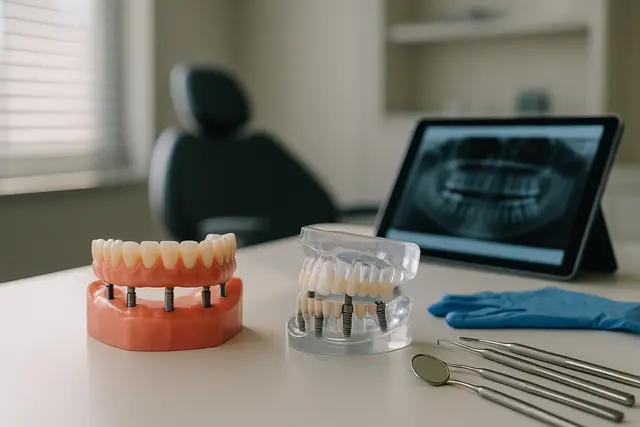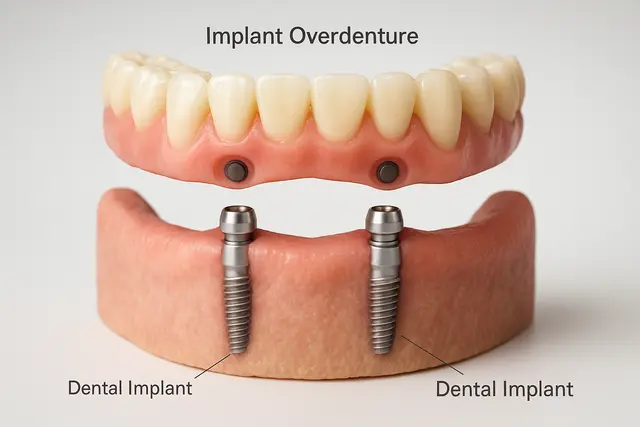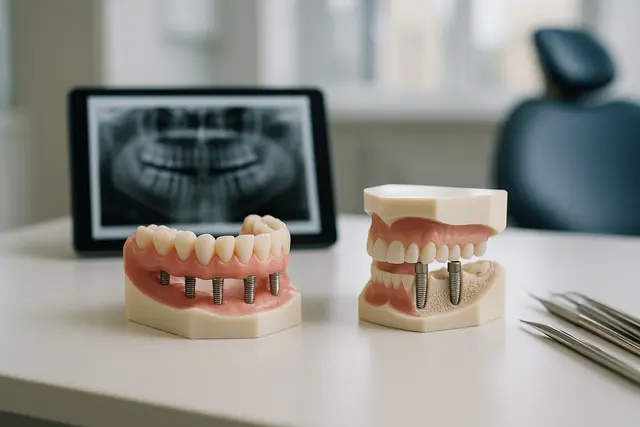Prosthodontics
5 min read
Oct 08, 2025
Dental Implant Side Effects Explained: Rare but Serious Risks
Dental implants have transformed the way we approach tooth replacement, offering a durable and natural-looking solution for missing teeth. While they’re known for their high success rate and long-term benefits, it’s important to be aware of the potential side effects, especially the rare but serious ones that can impact healing and oral health.

If you’ve been thinking about getting a dental implant to replace a missing tooth, you're definitely not alone. Dental implants are one of the most trusted options for tooth replacement, offering a solid, long-lasting solution that can restore your smile and your confidence. But let’s talk real for a second: no medical procedure is completely risk-free. That includes dental implants.
Now, before you toss your toothbrush across the room in a panic, know this, dental implants work. In fact, they have a high success rate, often cited around 95% when placed by a skilled and trusted dental professional. But it’s still smart to understand the rare but serious risks that could come along for the ride.
What Is a Dental Implant and How Does the Implant Procedure Work?
First, a quick recap. A dental implant is essentially a small titanium post that gets inserted into your jawbone where a tooth is missing. It acts like a fake tooth root, supporting an artificial tooth or crown on top. This little post becomes part of your mouth through a process called osseointegration, where your jawbone grows around the implant to secure it in place.
The implant procedure typically involves several steps: consultation, tooth extraction if needed, implant placement, healing, and eventually the crown attachment. It’s a journey, not a quick fix, but for most folks, it’s worth the wait.
Side Effects of Dental Implants That No One Likes to Talk About
Let’s get into it, the less glamorous side. While most people breeze through the process with no more than some soreness and swelling, others might face unexpected hurdles.
The most common dental implant side effects include:
Minor bleeding
Discomfort around the implant site
Slight bruising
These are generally short-lived and manageable with rest, ice packs, and a little ibuprofen.
But we’re here to talk about the not-so-common dental implant side effects, the ones you really want to be aware of.
When Dental Implants Don’t Heal as Expected
Sometimes, the healing process doesn’t go as planned. The implant may not fuse with the jawbone properly, which is essential for long-term success. This can be due to a number of things:
Smoking
Uncontrolled diabetes
Simply bad timing
When osseointegration doesn’t happen as it should, the result can be implant failure. That means the implant becomes loose or painful, and in some cases, the removal of the implant becomes necessary. Not fun.
The good news? Most of these factors are preventable or manageable with a good dental care routine and choosing the right implant surgeon who understands your specific oral health needs.
Serious But Rare Risks of Dental Implants
Now let’s talk about the heavyweight risks associated with dental implants. These aren’t common, but they’re serious enough to deserve your attention.
Nerve Damage: If the implant is placed too close to a nerve, especially in the lower jaw, it can cause tingling, numbness, or pain in the gums, lips, chin, or even your tongue. This can be temporary, but sometimes it's permanent.
Sinus Problems: Implants placed in the upper jaw can sometimes push into the sinus cavity if there’s not enough bone. That’s one way to get a sinus headache you won’t forget.
Infection: Any oral surgery has a risk of infection. Poor hygiene after the implant procedure or existing gum disease can lead to bacterial buildup around the implant.
Gum Recession: This is when the gum around the implant starts to pull away, exposing part of the metal. It doesn’t just look odd; it can also cause sensitivity and pain.
Bone Loss: If the implant fails or doesn’t integrate well, it can lead to bone loss around the area, making future tooth replacement options more complicated.
What Causes a Dental Implant to Fail?
Most people assume the implant itself is the issue, but often, it’s the conditions around it. Poor oral hygiene, smoking, undiagnosed gum disease, or rushing the healing process can result in implant failure.
Even the number of implants placed matters. Overloading a weak jawbone with too many can cause the implant to loosen or shift.
And let’s not forget implant rejection. Though rare (we’re talking really rare), some patients may experience an immune response where the body doesn’t accept the titanium post.
How Dentistry Helps Reduce the Risks Associated with Dental Implants
Here’s where modern implant dentistry shines. Technology like 3D imaging, digital planning, and guided surgery tools helps dentists pinpoint the best location for the implant, avoiding critical nerves and sinuses.
Plus, today’s dental implants are designed with biocompatible materials like titanium, which encourages strong osseointegration and reduces the risk of rejection.
A great dental practice won’t just pop the implant in and send you on your way. They’ll walk you through the implant needs specific to your jawbone, tooth location (hello, front tooth!), and gum condition.
The Role of Hygiene and Dental Care in Implant Success
We hate to sound like your nagging aunt, but brushing and flossing really matter here. Good oral hygiene helps prevent gum disease, which can lead to inflammation around the implant and even implant failure.
Stick to regular dental checkups so your dentist can check your implant and monitor for any early signs of trouble. Think of it like a tune-up for your smile.
Tooth Loss and the Importance of Early Action
Lose a tooth and think, "Eh, I’ll deal with it later"? That little gap in your smile isn’t just a cosmetic hiccup, it can actually cause nearby teeth to shift like they’re rearranging the furniture. Wait too long, and your jawbone might start to shrink, which sounds way cooler than it actually is (spoiler: it’s not). Missing teeth don’t just stay missing, they stir up trouble like a bored raccoon in your backyard.
That’s why dental implants are the go-to solution for keeping everything in place. Unlike dentures that might slip mid-sentence or bridges that rely on neighboring teeth to carry the load, implants anchor straight into the jawbone like nature intended, if nature had access to titanium.
Why the Success of a Dental Implant Depends on Teamwork
Let’s be real, this isn’t just about the dental implant abutment or how great the oral surgeon is (though those things matter). The long-term success of the implant depends on you too.
Following instructions after oral surgery, being gentle during the healing process, and maintaining a clean environment around the implant all contribute to success.
If the implant becomes loose or you notice any changes in how your tooth with a dental implant feels, don’t ignore it. That’s your mouth trying to tell you something’s up.
What Are the Most Common Side Effects After Dental Implant Surgery?
Common side effects include minor bleeding, swelling, soreness, and slight bruising around the implant site. These are typically short-term and manageable with over-the-counter pain relievers and proper aftercare. Most patients experience these symptoms during the initial healing phase and recover without issues. However, if discomfort persists or worsens, it's important to follow up with your dentist promptly.
What Rare But Serious Risks Are Associated With Dental Implants?
Although uncommon, serious side effects can include nerve damage (causing tingling or numbness), sinus problems if implants are placed too close to the sinus cavity, infection around the implant, gum recession, or even bone loss. These complications often arise from poor placement, underlying health conditions, or inadequate post-surgical care. Working with a skilled implant dentist and maintaining proper hygiene significantly reduces these risks.
What Can Cause a Dental Implant to Fail?
Implant failure can be caused by poor bone quality, smoking, gum disease, infection, uncontrolled diabetes, or mechanical stress like teeth grinding. In rare cases, the body may reject the implant. Most failures occur when the implant does not properly integrate with the jawbone (osseointegration), leading to loosening or discomfort. Proper screening, planning, and follow-up are key to reducing the risk of failure.
How Can You Prevent Dental Implant Complications?
To minimize complications, practice excellent oral hygiene, avoid smoking, manage any chronic conditions, and follow all post-surgery instructions from your dental team. Regular dental check-ups are essential to monitor implant health and catch early warning signs. Using tools like 3D imaging and guided surgery, modern dentistry can also help ensure precise implant placement and long-term success.
Read Next
Related Posts

Prosthodontics
Implant Supported Dentures Overview
Missing teeth can impact more than just your smile, they can affect your confidence, comfort, and even your diet. Fortunately, modern dentistry offers a solution that’s both secure and natural-looking: implant-supported dentures. This innovative approach blends the stability of implants with the convenience of dentures to create a long-lasting, life-improving upgrade.
5 min read
Oct 29, 2025

Prosthodontics
Implant Overdentures Explained: The Hybrid Solution to Missing Teeth
Missing teeth can impact everything from your ability to eat to your self-confidence. While traditional dentures have long been a go-to solution, they often fall short in comfort and stability. Implant overdentures offer a modern alternative that combines the security of dental implants with the convenience of removable dentures, a true upgrade for those looking to reclaim their smile.
6 min read
Oct 29, 2025

Prosthodontics
Implant Retained Dentures Explained
Considering implant-retained dentures? You're not alone. As modern dentistry evolves, more people are turning to this secure, natural-feeling alternative to traditional dentures. This guide will walk you through what they are, how they work, and why they might be the solution you've been looking for.
4 min read
Oct 28, 2025
Don’t have time to research every dentist around you?
See why 30k+ patients trusted us